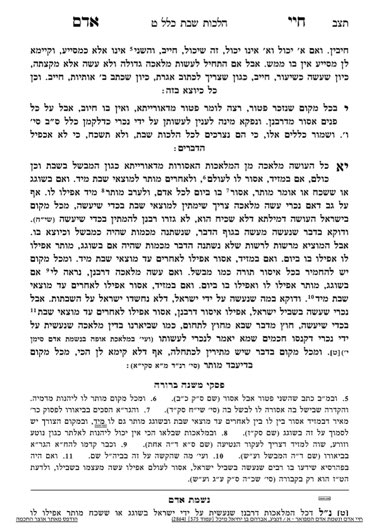Sponsorships for the upcoming Klalim, which discuss the 39 melachos of Shabbos, are available. Please contact Rabbi Reingold for more information at rabbireingold@gmail.com or 301.996.5910
We are continuing in siman 11, discussing the concept of maaseh Shabbos. We have finished the siman, and have a few other points to clarify.
We learned the halacha that when the melacha of planting was performed b’shogeig, since there is no way to tell that one is refraining from benefit from the melacha, the maaseh Shabbos must be uprooted. If they want, it can be replanted after Shabbos. Today, we will discuss whether this concept applies to other melachos.
Rav Menashe Klein ztl was presented with an interesting question by a chassid. This chassid apparently had a tremendous desire to record his rebbe’s Shabbos davening. He put a tape recorder on a timer inside the shtender and programmed it to turn on around the time the rebbe would be davening mussaf from the amud. The recording was successful. He later realized that maybe what he did was inappropriate, so he asked Rav Menashe Klein if he could benefit from the recording.
Rav Menashe Klein discusses how the melacha was done by the rebbe, and, since the rebbe was not aware he was doing anything, the rebbe is a shogeig or misaseik. He also discusses that the melacha involved in recording, where one is encoding digitally and the writing is not visible, is koseiv miderabanan. He concludes that it is maaseh Shabbos of an issur derabanan done b’shogeig, so the chassid (who is not the one who performed the melacha) can benefit after Shabbos.
The sefer Meor Hashabbos, in his section on maaseh Shabbos, suggests connecting this question to the halacha about plants. The knas of not using the maaseh Shabbos is not discernable, because there is no question that the chassid will not listen to the recording on Shabbos. If so, maybe it should be like the plant, where one must uproot it; in this case, one must destroy the recording.
On the other hand, he argues that in the case of the plant, the plant can be uprooted and replanted, so maybe the knas of Chazal was only to demonstrate that one is not benefitting from the item on Shabbos, but not to cause a permanent loss. Rav Shlomo Zalman suggests (discussing a different scenario) that if one did not immediately uproot the plant and it takes root to the point one cannot replant it, maybe one would not be obligated to uproot it.
Thus, the Maor Hashabbos leaves off with a question about whether we would extend the unique halacha of a plant to other scenarios.
If a person is walking in Eretz Yisroel during Shabbos and passes a news broadcast doing a live broadcast, they should not stop to listen. Listening is also considered benefit, so one should not listen on Shabbos. A broadcast, picture or article written on Shabbos which one would like to access after Shabbos would be similar to this question of the tape recording. None of these are kesiva mideoraysa, and there is arguably some level of shogeig on the part of the newsperson. Additionally, there is the argument of Rav Shlomo Zalman that there is no way to “redo” the item without its total destruction. If it is done for business purposes, it becomes akin to the case of the Ksav Sofer, and then it will be assur. If it is not done for business purposes, arguably it should be muttar.
If the argument applies that by desisting from the product, the company will stop being mechalel Shabbos, one would be chayav to refrain from use. Usually that is not the situation. Thus, bedieved, usually these cases will be muttar.
Summary
- Even when maaseh Shabbos of planting was performed b’shogeig, as there is no way to tell that one is refraining from benefit from the melacha, the maaseh Shabbos must be removed. Nevertheless, one may replant it after Shabbos.
- It is unclear whether this concept applies to other melachos. Bedieved, most such cases will be muttar.



